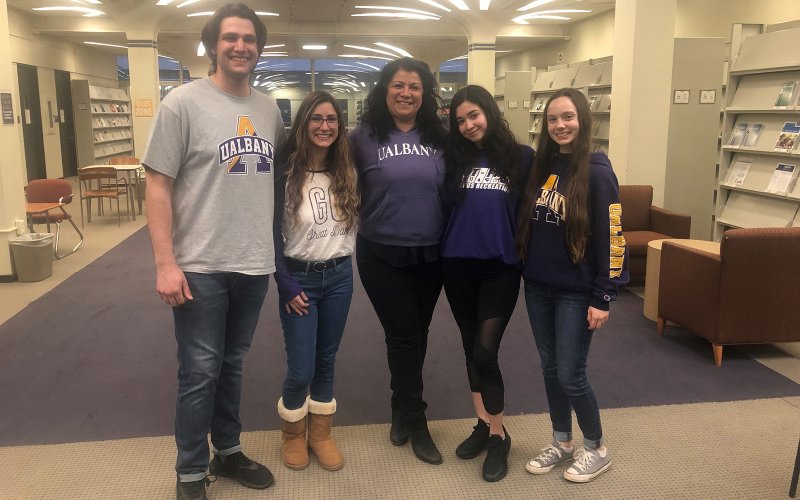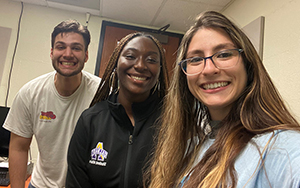A Podcast Gives a Voice to Students’ Challenges and Victories

ALBANY, N.Y. (May 3, 2022) — In 2019, armed with a $6,500 University StAR grant, Carmen Serrano set out to establish a largely student-run podcast that would give a voice to underrepresented and marginalized UAlbany students and alumni, with stories that would prove both instructive and inspiring to others.
Through this spring’s UAlbany Students Stories podcasts, it is evident that Serrano, associate professor of Spanish and director of the Spanish Program in Languages, Literatures and Cultures, has met her goal.
“Each episode chronicles student lives and underscores the many societal and institutional barriers students endure and overcome,” said Serrano. “Through their stories of hope and perseverance, they reflect upon society, culture, social justice, inequality and racism.”

A good number of the production and performance student workers have met and surpassed goals, as well. Students both from Podcast Team I (Spring 2020) and Podcast Team II (Spring 2022) have learned numerous skills that have enhanced their resumes and even helped some find employment.
The gap from Spring 2020 and 2022 was caused by the pandemic. After about 10 episodes in the interview format the first season, the podcast had to switch to student sound notes and voice memos, before becoming stilled all together for nearly two years. “It is still hard to hear those audio clips because we were all so scared and we didn’t know how all this COVID thing was going to turn out,” said Serrano.
Returning this spring with a Faculty Research Award Program grant in hand, the podcasts, with 1,046 subscribers, are alternately lively, passionate, funny and a bit quirky, guided by the show’s hosts, seniors Henry Grygas from rural Duanesburg and Claudia Pique, from Havana, Cuba, now living in East Greenbush. Both were recruited by Serrano from her Spanish classes.
So too were Jessica Dandrow, the principal editor, “a beautiful writer who spends hours making each episode sound professional,” said Serrano, and Rashel Jimenez, the podcast’s head of marketing who created, among many successful initiatives, the podcast’s Instagram account.
Grygas says he’s honed his host duties by learning to listen more. “The thing about hearing someone’s story is that it’s a unique experience,” he said. “To sit down and hear what someone thinks of as their story is intimate.”
“I believe that the main task of a host is to create a comfortable judgment-free space to allow the guests to share their stories comfortably,” said Pique. “What has impressed me the most is the power of a good open-ended question to get to know the way our guests think and how they experience their reality. It has become already part of my personality to take a step back and just ask and listen, thanks to the podcast.”
Podcast stories have many varieties. Some are very serious about difficult struggles to enter and afford college, and to overcome immigration and other issues from childhood. Their endings are invariably happy ones, about the success they found socially and intellectually at UAlbany.
Other stories can take serious subjects, such as cultural stereotyping, and hear how a person, with invention, found fulfillment. A recent example was Marielis Cepin, a senior who entered UAlbany as a freshman with the straight hair — through ironing — demanded by her mother. In time, she embraced her natural look, and now provides advice on others making the transformation, including on her Instagram site, MCurlyy. (Yes, double “y.”)
Another recent storyteller, Chris Stewart, told of his nontraditional path to UAlbany, being medically retired from the U.S. Navy at a young age, and his trip to finding an engaging discipline, cybersecurity, and an appreciation of Latin through his UAlbany instructor, Charlie Giglio. He also discussed, with his fascinated co-hosts, his array of body tattoos.
“I’d never have imagined that tattoos could be such a fascinating subject,” laughed Serrano. “But I’m just very proud of our team for giving voice to many students. UAlbany Student Stories is meant to be inspiring examples of people who have done well and show others the way."
“And it’s also designed to be an archive or oral histories — an historical document of where students were at a certain period of time — podcasts that began in 2019, got interrupted, then came back. We have all improved with time. We will take our new knowledge and apply it to the next season.” Serrano, who spends 4-20 hours editing each podcast, said she has applied for a half million dollar National Endowment for the Humanities grant to ensure the podcasts’ future.
“The podcasts are creating solidarity among listeners and will become a powerful research and teaching tool that can contribute to building a more inclusive and sustainable society,” she said.
Grygas said he’s felt this solidarity in unexpected ways. “We’re all students on a campus, learning, growing and living,” he said. “I think the main thing I’ve learned is that it’s impossible to look into someone’s eyes, hear their story and feel any ill will towards them.
“Hearing these stories, every time, engenders a feeling of love for the people speaking that I can’t explain. They may have lived a life completely different from mine, but the emotions and sensations are all the same.”




